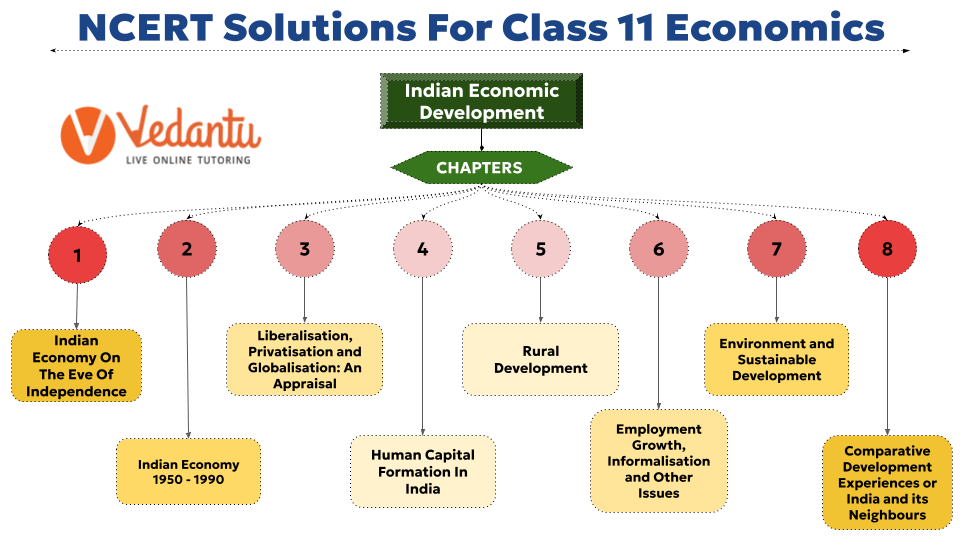NCERT Solutions for Class 11 Economics (Indian Economic Development) - FREE PDF Download
NCERT Solutions for Class 11 Economics





















FAQs on NCERT Solutions for Class 11 Economics 2024-25
1. Which are the Important Topics for Class 11 Economics?
The important topics for class 11 economics that the student must study in detail are meaning and difference of micro and macroeconomic concepts, consumer equilibrium, meaning of utility, the concept of marginal utility, market structure, the mechanism of demand and supply, demand and supply curve, the meaning of and factors affecting elasticity of demand.
Apart from this, students also need to learn producer behaviour and supply chain, the concept of short-run and long-run production, average product, marginal product, supply curve and producer equilibrium.
2. What is Meant by Sustainable Development?
The concept of sustainable development is a critical notion that is meant to define the process by which a country manages its production without causing depletion in the country’s natural resources and bringing about environmental degradation.
This process largely follows a series of development that ensures a sustained increase in the per-capita income of a country, coupled with rational use of raw materials and natural resources. It uses strategies like the use of a non-conventional source of energy like a hydro power plant, or use of LPG for increasing energy efficiency as well as reducing environmental pollution.
3. How Helpful is NCERT Economics Class 11 Solutions?
The NCERT solution for Class 11 is extremely helpful for students preparing for the board examinations. The solutions provide a detailed definition of crucial economic concepts like marginal utility, demand and supply, etc. so that the student can effectively learn the basics.
These solutions also provide a diagrammatic explanation to elucidate on topics related to increase and decrease in demand and its mutual effect on the economic transaction and gross income of a country. The Solutions also helps students to understand the concept of supply chain and factors that affect the supply chain through statistical and diagrammatic analysis.
4. What is Economics Class 11 all about?
The Economics syllabus for Class 11 provides critical insight into the details of important concepts such as privatisation, liberalisation, globalisation, sustainability, etc. This helps students clarify the important concepts in Economics to gain proper knowledge of the fundamentals of this subject. To have an effective understanding of the vast syllabus of Class 11 Economics, it is imperative to go through the NCERT solutions by Vedantu which are guaranteed to help you to understand the concepts easily and clearly. Curated by experts in the field, this PDF is free to download, meaning you can study from them at your comfort and convenience.
5. Is Economics hard in Class 11?
No, Economics for class 11 is not hard, but because a lot of new concepts are introduced, it is a good idea to refer to NCERT Solutions. These solutions offered by Vedantu are accurate and effective for exams and help the students to clear out the concepts with ease. The solutions provided by us are free and also available on the Vedantu Mobile app, making it much easier.
6. Which is the best book for Class 11 Economics?
There is no substitute for your NCERT book for Class 11 Economics because it is prepared according to the syllabus prescribed by CBSE. You can also download the NCERT Solutions PDF from Vedantu to get a good grip on all the topics and concepts in the book for even better results in Class 11. The solutions here are free of cost and also available on the Vedantu Mobile app.
7. What is Economics in one word according to Class 11th Economics?
Economics is about "choices". It revolves around how people and societies make decisions on using limited resources to fulfil their unlimited wants and needs.
8. How can I get full marks in Class 11th Economics?
To score well in economics, focus on understanding key concepts rather than memorising. Practice solving numerical problems and understand the application of economic theories. Regular revision, using NCERT textbooks and reference books, and seeking clarification on doubts from teachers can also help in achieving full marks.
9. What are the five big questions of Economics Solutions Class 11?
The five big questions in economics are:
What to produce?
How to produce?
For whom to produce?
How to ensure economic efficiency?
How to achieve economic equity?
10. What is the most important question in Economics Solutions Class 11?
The most important question in economics revolves around how scarce resources can be efficiently allocated to satisfy unlimited human wants and needs. This fundamental question underpins economic theories and policies.
11. How many types of Economics are there in Class 11?
In Class 11 Economics, the main types of economics discussed are microeconomics and macroeconomics. Microeconomics focuses on individual economic units like households and firms, while macroeconomics examines the economy as a whole, including aspects like inflation, unemployment, and national income.
12. What is the best way to study Economics Class 11?
The best way to study economics is to understand basic concepts thoroughly before moving on to more complex topics. Practice solving numerical problems to grasp economic theories practically. Use diagrams and charts to visualise concepts. Regular revision and discussing doubts with teachers or peers can also enhance understanding.
13. Who is the father of Economics Class 11?
Adam Smith is often referred to as the father of economics. His book "The Wealth of Nations" laid the foundation for classical economics and introduced the concept of the invisible hand, which explains how self-interested individuals unintentionally promote the public good.
14. What is the root word of Economics Class 11?
The root word of economics is derived from the Greek word "oikonomia", which means "management of a household". In modern terms, economics refers to the study of how societies manage scarce resources to meet their needs and wants.



